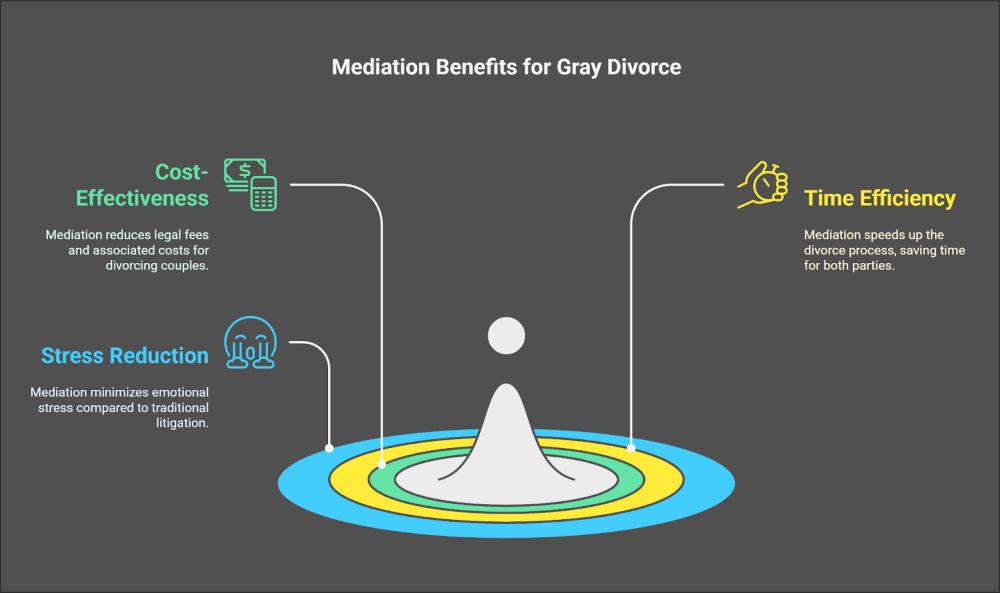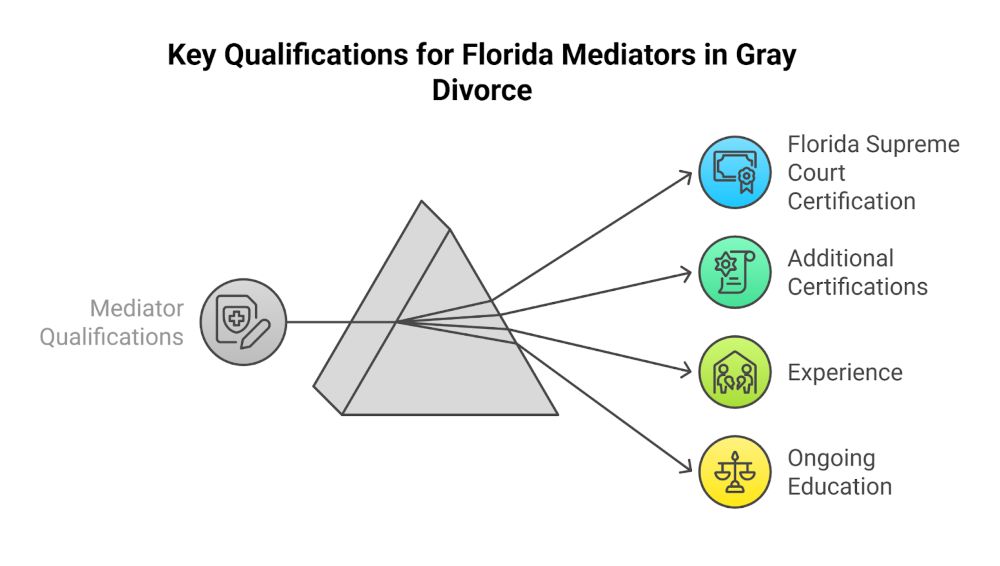
Florida’s Professional Mediation Standards: Why They’re Essential for Older Couples Considering Gray Divorce in 2025

Did you know that divorce rates for couples over 50 have doubled since the 1990s?
Gray divorce, the term for couples splitting up after age 50, is becoming more common in Florida.
New laws are changing how these separations happen. Knowing about Florida’s professional mediation standards is key for older couples considering divorce.
Florida’s mediation standards help older couples navigate divorce more smoothly and fairly.
These rules make sure mediators are trained to handle the unique issues that come up in gray divorces.
Things like retirement accounts, health care, and long-term financial planning are big concerns for older couples.
Florida’s revised mediation laws take effect on January 1, 2025. They aim to make the process clearer and more helpful for everyone involved.
For couples over 50, these changes could mean a less stressful and more positive experience during a tough time.
Key Takeaways
- Professional mediation standards in Florida protect older couples during divorce.
- New laws in 2025 will improve the mediation process for gray divorces.
- Choosing a qualified mediator helps address unique concerns of divorcing after 50.
The Economic Impact of Gray Divorce

Gray divorce can have significant financial consequences for older couples. The economic effects often differ between men and women, and they can have long-lasting implications for retirement and overall financial stability.
Statistics on Average Change in Income for Divorced Men and Women
Gray divorce tends to affect men and women differently in terms of income. Women typically experience a more substantial drop in their standard of living after divorce compared to men.
Studies show that women’s income often decreases by 20-30% following a gray divorce. Men, on the other hand, may see a slight increase or maintain their pre-divorce income levels.
This disparity is partly due to women being more likely to have taken career breaks for family responsibilities. These breaks can impact their earning potential and retirement savings.
Long-Term Financial Consequences for Older Adults
The long-term financial effects of gray divorce can be far-reaching. Older adults may face challenges rebuilding their wealth and securing a comfortable retirement.
Divorced individuals often need to split retirement accounts and other assets. This division can leave both parties with less savings than they had planned for their golden years.
Housing costs can increase significantly for both ex-spouses. They may need to maintain separate households on reduced incomes.
Health insurance can become a major expense, especially for a spouse who was previously covered under their partner’s plan.
Repartnering after gray divorce is more common among men than women (31% vs. 20%). This can further impact financial recovery, as those who remarry often have better economic outcomes.
Florida’s Professional Mediation Standards: An Overview
Florida’s mediation standards aim to ensure fairness and professionalism in dispute resolution. They guide mediators in helping couples navigate difficult decisions with care and expertise.
Brief History and Purpose of These Standards
Florida’s mediation standards were first introduced to bring consistency to the mediation process. The Florida Supreme Court regularly updates these rules to meet changing needs.
The standards serve several key purposes:
- Ensuring mediator competence
- Protecting the rights of all parties
- Promoting ethical conduct
- Maintaining public trust in the mediation process
These standards provide a framework for fair and respectful negotiations for older couples considering divorce.
Key Components of the Standards
The Florida Rules for Certified and Court-Appointed Mediators outline important requirements for mediators. These include:
- Qualifications: Mediators must meet specific training and experience criteria.
- Ethical conduct: Guidelines for impartiality, confidentiality, and professionalism.
- Self-determination: Empowering parties to make their own decisions.
- Conflict of interest: Rules to avoid bias or unfair influence.
Mediators must also stay current with ongoing education. This ensures they can handle complex issues that may arise in gray divorces, such as retirement asset division or long-term care planning.
Feeling overwhelmed by the complexities of a gray divorce? Let us help you navigate this life-changing journey with compassion and expertise. Schedule your confidential consultation today.
If you’re ready to get started, call us now!
Why Professional Mediation Standards Matter for Gray Divorce
Professional mediation standards play a crucial role in guiding older couples through the complex process of gray divorce.
These standards ensure fair outcomes, address financial intricacies, and consider the emotional aspects unique to ending long-term marriages.
Ensuring Fairness and Impartiality
Gray divorce mediation relies on professional standards to maintain fairness and impartiality.
Mediators must follow ethical guidelines that protect both parties’ interests. They help create a balanced environment where each spouse can voice their concerns and needs.
Mediators use their training to:
- Identify power imbalances in the relationship
- Encourage open communication
- Prevent one spouse from dominating discussions
These standards are especially important for couples ending long-term marriages. They help address issues that may have built up over decades.
By adhering to professional standards, mediators can guide couples toward mutually beneficial solutions.
Addressing Complex Financial Issues
Gray divorce often involves intricate financial matters. Professional mediation standards ensure that mediators are equipped to handle these complexities. They must stay updated on laws and regulations affecting older couples’ finances.
Key financial areas addressed in gray divorce mediation include:
- Division of retirement assets
- Social Security benefits
- Long-term care insurance
- Estate planning considerations
Mediators help couples understand the long-term impacts of their financial decisions. When necessary, they can suggest bringing in financial experts. This approach helps couples make informed choices about their future financial security.
Emotional Considerations In Gray Divorce
Ending a long-term marriage can be emotionally challenging. Professional mediation standards recognize the need for emotional support during this process. Mediators are trained to handle sensitive situations with empathy and care.
They help couples:
- Process grief over the end of their marriage
- Manage anger or resentment
- Deal with fears about the future
- Maintain dignity throughout the process
Mediators can suggest counseling or support groups when appropriate. They create a safe space for couples to express their feelings without judgment.
This emotional support is vital for helping older couples transition to their new lives after divorce.
Are you struggling to divide decades of shared assets or secure retirement after a gray divorce? Peacemaker Mediation Group guides older couples through these challenges with fairness and care. Reach out to us for trusted support now.
If you’re ready to get started, call us now!
The Benefits of Mediation Over Traditional Litigation for Older Couples

Mediation offers several advantages for older couples going through a gray divorce. It provides a more cost-effective, efficient, and less stressful approach to ending a marriage.
Cost-Effectiveness
Divorce mediation in Florida is often more affordable than traditional litigation. The average cost of mediation ranges from $3,000 to $8,000. This is much lower than the expenses associated with court proceedings.
Older couples can save money on legal fees and court costs, which they can use for their retirement or other important expenses.
Mediation allows couples to divide their assets more efficiently, which can lead to better financial outcomes for both parties.
Time Efficiency
Mediation typically moves faster than litigation. Older couples can resolve their divorce issues in weeks or months rather than years.
This speedier process allows seniors to move forward with their lives more quickly. They can focus on rebuilding and enjoying their golden years.
Florida requires mediation before court proceedings because it is effective. Couples who choose mediation can avoid lengthy court wait times and multiple hearings.
Preservation of Relationships
Mediation promotes a more amicable approach to divorce. This is especially important for older couples who may have shared decades together.
It allows couples to maintain respectful communication. This can be crucial for future family gatherings or shared grandparenting responsibilities.
Mediators help couples find common ground and mutually beneficial solutions. This cooperative approach can lead to better long-term outcomes for all involved.
Stress Reduction Compared to Courtroom Battles
Courtroom litigation can be emotionally draining, especially for seniors. Mediation offers a less confrontational environment.
Couples work together to find solutions rather than fighting against each other. This can reduce the emotional toll of divorce.
Mediation gives couples control over their futures. They make their own decisions instead of leaving them to a judge. This sense of control can greatly reduce stress and anxiety.
The private nature of mediation also helps protect sensitive information. Older couples with established reputations can particularly value this privacy.
Choosing a Qualified Mediator in Florida

Picking the right mediator is crucial for older couples going through a gray divorce in Florida. A skilled mediator can help navigate complex issues and reach fair agreements.
What to Look for in a Mediator’s Credentials
Florida Supreme Court certification is a key qualification for mediators. This ensures they’ve met rigorous training and ethical standards. Look for mediators with additional certifications in family law or elder issues.
Experience matters, too. Mediators who have handled many gray divorces will understand the unique challenges older couples face. They can offer insights on retirement asset division and long-term care planning.
Check if the mediator engages in ongoing education. This shows commitment to staying current with legal changes and mediation techniques.
Questions to Ask Potential Mediators
When interviewing mediators, ask about their approach to gray divorce cases and their success rates with similar situations.
Some key questions:
- How many gray divorces have you mediated?
- What’s your strategy for handling complex financial issues?
- How do you ensure both parties feel heard and respected?
- Can you provide references from past clients?
Ask about their availability and fees. Some mediators offer sliding scales or package deals for extended sessions.
Importance of Specialization in Family Mediation
Mediators who focus on family law, especially gray divorce, bring valuable expertise. They understand the emotional and financial complexities of ending long-term marriages.
These specialists often have networks of financial advisors and therapists. If needed, they can refer couples to extra support.
Family mediation experts know how to address adult children’s concerns. They can help couples communicate better about shared family events post-divorce.
Specialized mediators stay updated on Florida’s changing family laws. This knowledge ensures agreements comply with current regulations.
Conclusion
Gray divorce presents unique challenges for older couples in Florida. Professional mediation offers a thoughtful approach to addressing these issues.
Mediators help spouses communicate effectively and find mutually beneficial solutions. This process can reduce stress and costs compared to litigation.
Florida’s high standards for mediators ensure quality services. Certified mediators have extensive training in conflict resolution and family law.
Choosing mediation for gray divorce allows couples to maintain control over outcomes. It promotes cooperation and can lead to more satisfying agreements.
Older couples benefit from mediators’ expertise in handling complex financial matters, such as dividing retirement accounts and determining alimony.
Professional mediation also helps preserve important relationships. It can ease tensions between divorcing spouses and their adult children.
As gray divorce rates continue to rise, Florida’s mediation standards become increasingly important. They provide a framework for resolving disputes fairly and efficiently.
Couples considering gray divorce should explore mediation as a viable option. It offers a path to a more peaceful and dignified separation.
Gray divorce can feel like the end of the road, but it’s also a chance to start fresh. Peacemaker Mediation Group is here to help you find clarity, protect your future, and ensure a dignified process. Call today to take the first step toward peace and resolution.
Contact Us Today For An Appointment
Frequently Asked Questions
How does mediation benefit older couples going through a gray divorce in Florida?
Mediation offers a less stressful experience for older couples divorcing in Florida. It allows them to maintain more control over the final outcomes of their separation.
Couples can discuss complex issues like retirement assets and healthcare costs in a calm, private setting. This approach often leads to more tailored solutions that consider the unique needs of older adults.
What are the professional mediation standards in Florida for handling a gray divorce?
Florida has strict standards for certified mediators. These standards ensure mediators remain neutral and facilitate fair discussions.
Mediators must complete specific training and continuing education to maintain their certification. They are expected to help couples focus on resolving disputes without providing therapy, counseling, or legal advice.
In what circumstances might mediation not suit couples going through a gray divorce?
Mediation may not be appropriate when there is a history of domestic violence or significant power imbalances between partners. In these cases, alternative dispute resolution methods might be more suitable.
Mediation may be ineffective if one partner hides assets or refuses to disclose financial information. To ensure fair outcomes, more formal legal processes are often required.
Can you explain how the seven-year divorce rule applies to gray divorce mediation in Florida?
The seven-year divorce rule in Florida relates to the duration of alimony. For marriages lasting 7-17 years, alimony may be awarded for up to 75% of the marriage’s length.
In gray divorce mediation, this rule often comes into play when discussing financial support. Mediators help couples understand how this rule might affect their post-divorce financial arrangements.
What key challenges do mediators face when assisting older couples in a gray divorce?
Mediators often grapple with complex financial situations in gray divorces. These may include dividing retirement accounts, pensions, and real estate accumulated over decades.
Health concerns and long-term care planning also present unique challenges. Mediators must help couples address these issues while considering each person’s future needs and financial stability.
What support structures are in place for older couples to engage in effective mediation during a gray divorce in Florida?
Florida courts provide resources to support mediation processes.
This includes information on choosing qualified mediators and understanding mediation procedures. Many communities offer support groups for older adults going through divorce.
These groups can provide emotional support and practical advice during the mediation process.




